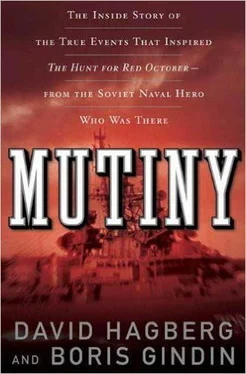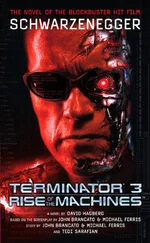All of them locked in the compartment began to realize that they were in deep trouble now. This was no longer an exercise in which passive resistance would do any good. Simply having voted with a black backgammon piece wouldn’t be enough to convince a military tribunal that they were innocent officers who had been duped by their zampolit.
But the situation was hopeless. They were locked in a belowdecks compartment, and even if they could somehow get the hatch open and rush out into the corridor, there was at least one sailor with a weapon standing guard. They would be cut down before they took two steps. There wasn’t a damn thing they could do. They had sealed their fate with the vote in the midshipmen’s mess.
Gindin walks to the hatch that opens into the smaller compartment and stares at the pump mechanism in the dark corner.
“My career was spent learning how to fix things,” Gindin says. “How to keep a warship’s mechanical equipment operating in perfect condition. I’d never dreamed about sabotage, except how to recognize it and how to fix something that had been deliberately wrecked.”
“What is it, Boris?” Captain Lieutenant Proshutinsky asks, coming over. “Have you thought of something?”
Gindin looks over his shoulder at the officer, almost afraid of what he’s about to suggest. “All our drinking water comes from the main tank in the bow.”
“Okay,” Proshutinsky says after a beat. “What of it?”
“A ship can’t get far without drinking water for the crew.”
“That’s true.”
Gindin nods toward the mechanism in the corner. “That’s the pump that draws the water out of the main tank.”
Understanding dawns on Proshutinsky all at once. “Eb tvoiu mat,” he swears softly. “Can you do it?”
“I can do it,” Gindin says. “The question is: Should I do it?”
“Of course. Whatever it takes to stop Sablin and the other maniacs you must do, and I will back you up one hundred percent if there are any questions.”
Gindin has to laugh inwardly. Proshutinsky still doesn’t get it. There’ll be questions, for whoever survives this business. And Gindin suspects that none of them will be very easy to answer.
“What can we do to help you?” Proshutinsky asks.
“Just make sure that one of the guards doesn’t decide to come in here and find out what’s going on.”
Gindin rolls up his shirtsleeves and quickly goes through the drawers of tools and spare parts, finding a couple of screwdrivers, an adjustable wrench, and a socket set. It’s all he needs.
It takes him about forty-five minutes, working in the dim light, to shut down the pump and disassemble it. From now on there’ll be no freshwater anywhere on the ship, and it won’t be long before one of Gindin’s crewmen figures out what has probably happened and comes to investigate.
Gindin sits back on his haunches and looks at the pump parts spread out all over the place. At least four guys on his crew had the knowledge and skills to come in here and within an hour or two have the pump put back together and running again.
If they could find the parts.
“Are you done in there?” Proshutinksy asks from the open hatch.
Gindin looks up. “No more water for the ship,” he says. “I want to keep it that way. Give me a hand, please, sir.”
“Sure.”
Gindin pulls up a couple sections of the deck grating that opens to the bilges. As Proshutinsky passes him the parts from the pump, Boris drops them into the bilge, tossing some of them farther aft and some farther forward. Now if someone comes to put the pump back together it won’t be such an easy job. First he’ll have to find all the parts, including a lot of small nuts, bolts, washers, springs, gaskets, C-clips, and gears and impellers. It won’t be such an easy job, and it’ll take a lot of time.
Time, Gindin hopes, for Sablin to come to his senses, or for someone to come to their rescue.
Someone taps on the forward bulkhead. It sounds to Gindin like a piece of metal, perhaps a pipe, being banged against the steel wall.
“What the hell is that?” Proshutinsky demands.
Gindin holds up a hand for silence. The banging starts again, then stops.
“Someone is trying to communicate with us,” Proshutinksy says.
Gindin picks up a wrench and taps a couple of times against the bulkhead.
Almost immediately someone calls out from the other side, “Who is it?”
“My God, it’s the captain,” Gindin says. “Captain Potulniy!” he shouts. “Can you hear me, sir? Are you okay?”
“Boris, is that you?” Potulniy’s voice is muffled but understandable.
“Yes, sir. Are you a prisoner? Have you been hurt?”
“I’m fine, but they’ve locked me in the forward sonar supply compartment. Are you alone?”
“No, there are nine of us,” Gindin replies. Now the others have joined Proshutinsky at the hatch. “We’re locked in, and there’s no way of getting out. But I disabled the freshwater pump, so there’s no drinking water anywhere aboard ship.”
“Very good, Boris.”
“Ask him what happened,” Proshutinsky says.
“What happened, sir?” Gindin calls out. He wants to shout loudly enough so that the captain can hear him, and yet he doesn’t want to alert the guards outside in the corridor.
“It was Valery. He told me that some sailors were drinking down here, so I went with him to find out what was going on. Before I could do anything he had me locked in.”
“We’re on our way downriver, I think,” Gindin shouts.
“Yes, I know,” Potulniy replies. “Is there a possibility of you getting out of there and releasing me?”
“I don’t know, Captain. But we’ll try to think of something.”
“You’d better hurry, Boris, because I don’t think we have much time.”
“Sir?”
“Someone must know that we have sailed too early, and they’ll be trying to contact us,” Potulniy explains. “If Sablin can’t give them a good answer, and if he actually makes it out to the gulf, they’ll come after us. Someone will give the order to find us and sink us.”
No matter what happens, from this point the lives of all the men aboard the Storozhevoy will be forever changed, and mostly not for the better.
PART 7
NINE OUNCES

Right after the October Revolution of 1917 the tsar’s police forces were disbanded and in their place a civilian militia was created. But the militia members were factory workers, some of them peasants, who had no experience being cops.
It didn’t take long for the Council of People’s Commissars to start a secret political police force, called the Cheka, led by Felix Dzerzhinsky, whose statue was in the courtyard of the KGB’s Lubyanka Center in 1975. The main power that was given to the new secret police was the right to hold trials outside the normal judicial system. The Cheka was also empowered to execute anyone it found guilty. No appeals. No second chances. No defense attorneys. No writs of habeas corpus. All of it to protect the revolution.
Over the coming years the Cheka’s name was changed to the GPU, the OGPU, the NKGB, the NKVD, and finally the Komitet Gosudarstvennov Bezopasnosti, the Committee for State Security, the KGB. But each of these organizations was charged with doing the same things: finding the bad guys, giving them a down-and-dirty trial in secret, and either sending them to a gulag or giving them what was called their nine ounces or, sometimes, their Russian insurance, which was a 9mm bullet to the back of the head at contact or near-contact range.
Читать дальше













